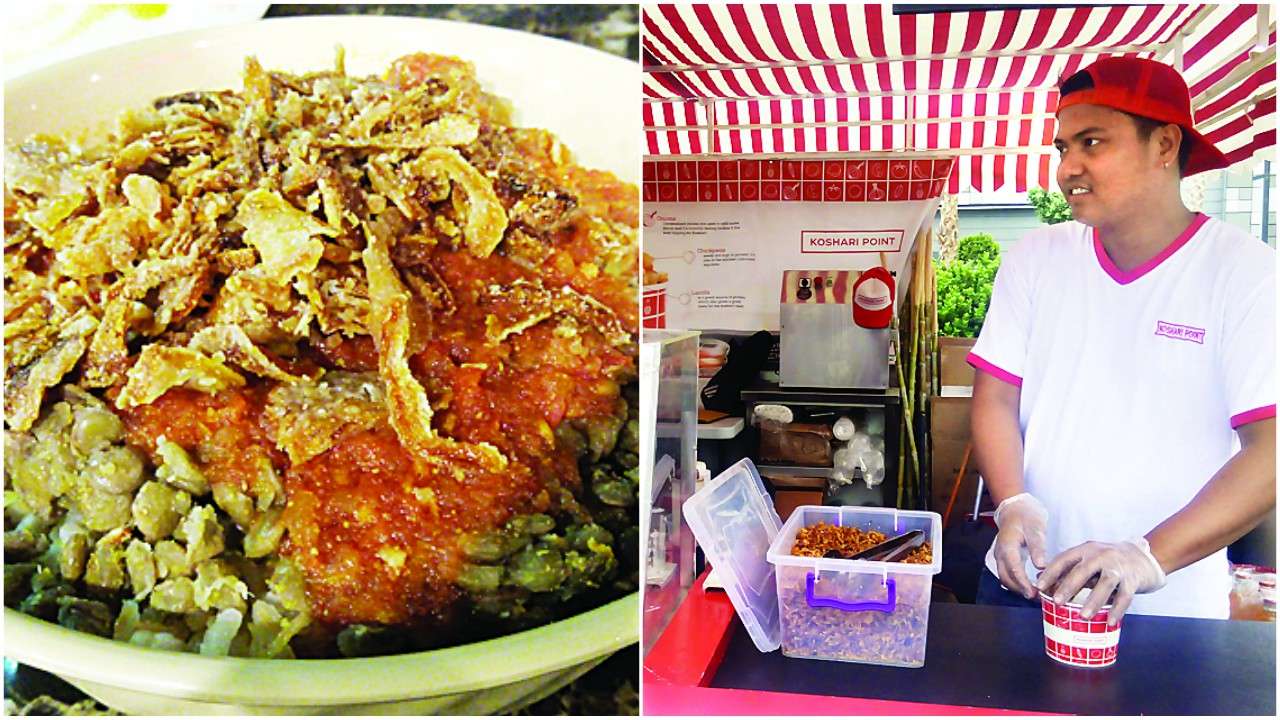
Except for moussaka and a couple of other dishes, most of us didn't recognise much on the menu of Al Dahan, an Egyptian pop-up restaurant at Dubai's Global Village. Fortunately, our Egyptian guide Diaa Elsadat, decided to choose for us. From the tabouleh, moutabel, karakade (hibiscus tea), and some kebabs that arrived at our table, what stood out for me was koshari – a rather simple, yet filling, layered dish. Egyptian rice, that is of a smaller grain-size, is piled on with macaroni or pasta (ours had some spaghetti too), then ladled on with brown lentils and chickpeas, and finally sprinkled with a crown of crunch – fried onions and ersh mhmaf (nacho-like deep-fried rectangular crisps). On the side we were served more crunchies (in case we required a more generous helping) and condiments that complete the dish – a tomato sauce, a hot sauce and garlic juice – to be added as per liking.
The result turned out be an eclectic range of flavours that tied up astonishingly well, and varying textures that increased the pleasure of every bite. Our Dubai Food Festival (DFF) hostess, Salma Tokai, an Egyptian herself, gushed, "my grandma makes it best". But I, for one, felt that the restaurant's plating too was homely and had already fallen for this sumptuous dish, a comfort food that I chose to lunch on even the next day, despite other options available at eateries.
But the curiosity about how macaroni met lentils, and that too in Egypt, left me restless. Elsadat, so far, had only told us about how it was a poor man's grub and that koshari comes from the Jewish kosher, which means 'allowed as per Jewish law', leaving a lot unanswered. I pressed him further after the trip and found out that there are two theories about koshari's origin. One seems to have its roots in the Quran. "The Hebrew word kosher means halal, which originally denoted no meat, no beef, and now is about slaughtering in a certain way. Tired of eating manna and quail day after day, when people asked Musa for variety – herbs, cucumbers, fum, onion, lentils and other things that the earth grows – God got upset that the people didn't appreciate the pure, easily available foods he'd provided them, but wished for an inferior vegetarian fare, and so punished them for 40 years during which they could only eat what they'd asked for," explains Elsadat.
Al Dahhan offers its Egyptian pop-up only at the Global Village, from winter to the onset of summer.
Elsadat also suggests trying the Egyptian dish at Koshari Point that has several branches in Dubai and the Egyptian restaurant, Abu Tarek in Al Barsha.
However, the macaroni in koshari still remains a mystery. The more believable theory seems to be this second one – "In the 19th century, Egypt had a mixed culture and was influenced by those it had trade relations with. Indians brought their khichdi (a rice and lentil dish) and Italians, who were invading Egypt, their pasta. Egyptians mixed the two and peppered it with their own flavours and crunch." The result was the easy-to-make, carb-and protein-rich koshari that first saw popularity "with soldiers and then blue collar workers as it is inexpensive to make," explained Elsadat.
Today in Egypt, koshari, usually eaten for lunch, is made at home, served on the streets, by food trucks, at small eateries as well fancy restaurants. And with a significant number of Egyptians residing in the UAE, Dubai has several places offering it too.